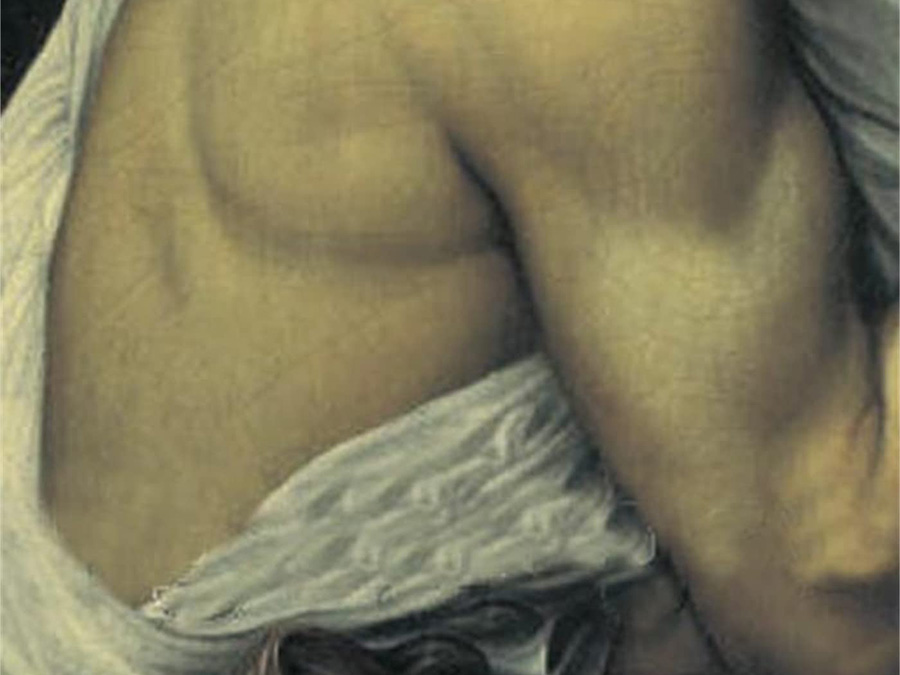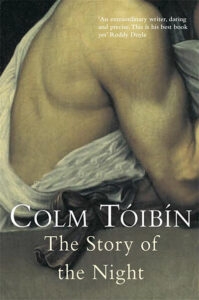A fascinating window into a difficult life. Richard Garay is a young gay man trying to find his way in Argentina after the death of his parents, navigating homophobia and dictatorship and the early days of AIDS among a myriad of problems in his own life.
Colm Toibin opens his novel The Story of the Night with nothing much happening: a young man is living in his dead mother’s apartment in Buenos Aires, looking out of the window, remembering his mother and his childhood. It sounds boring, doesn’t it? And yet I loved it.
I think what I loved most of all was the voice, which was literary and deeply personal and very compelling. The narrator, Richard Garay, is telling us things about his life in his own way, in the order in which they matter to him. He’s jumping around in the way our thoughts tend to. He’s ignoring all the usual writing advice, especially the dictum to show rather than tell. He just tells us a lot of things about his life in a way that feels very real and authentic, perhaps because it’s done in the same way our minds tend to work: by association rather than chronology.
There are scenes and action, but they mostly come later, as punctuation to illustrate a particularly important moment in the development of the character or plot, rather than showing us everything that happens.
And there are frequent glimpses of bigger themes like war, sexuality, and this beautiful depiction of living under a burgeoning dictatorship:
“Maybe it is possible that I could watch someone being dragged away in front of my eyes and not recognize it. I would somehow miss the point, and maybe that is what I did, and others like me did, during those years. We saw nothing, not because there was nothing, but because we had trained ourselves not to see.”
There are lots of political themes in The Story of the Night, such as:
- what it’s like for someone of British ancestry to be living in Argentina during the Falklands War
- the role of the CIA in Latin America
- what it’s like to be gay in a homophobic society
- the horrific effects of the AIDS pandemic
But Toibin reveals them gradually, in glimpses here and there, and then shows us their effects through the deeply personal experiences of young Richard Garay. He fumbles his way through the world, lost and alone much of the time, and he gets involved in sexual adventures and dalliances with the CIA and shady deals with corrupt businessmen, and he falls in love, and he slowly works out who to trust.
Toibin is very skilled at showing us aspects of Richard’s character both good and bad. He’s gentle and caring but also weak and easily led. He initially refuses the corrupt deal with the shady businessman but then ends up doing it later, only to try to back out again when it’s too late. We’re focused on his character, and the political themes come in through the back door.
But although there was much to admire, I still felt a little disappointed at the end. I think perhaps it’s because of Richard’s passivity, which makes him a difficult character to follow. He seems to be sleepwalking through life for most of the book. He’s swept along by the Americans and then by the corrupt businessman and then by his lover Pablo, and then he’s easily diverted and seduced by random good-looking guys in bath houses. He’s just being pulled along, and he’s not taking control of his life.
I think this passivity is intentional, and it certainly felt true and believable, but I think it’s what left me feeling disappointed. Passive characters like this can work very well in contradistinction to someone active and charismatic, e.g. a Nick Carraway to a Gatsby or a Sal Paradise to a Dean Moriarty. But nobody else in The Story of the Night is particularly commanding or charismatic either. They’re interesting as secondary characters, but I was left feeling as if there was something missing.
A lot of the threads in the book don’t really go anywhere either. Again, I think this is intentional, and perhaps it’s a reflection of the ravaging effects of AIDS on the gay community in the 1980s: so many lives were cut short before their threads could come together into something more solid and fully formed. But when the book ended, I was left feeling, “Hey, what about…”
Still, though, I loved the prose throughout—at times it reminded me of another Irish writer I admire, John Banville—and I’d like to read more by Colm Toibin now. I remember also liking Brooklyn, although I never reviewed it so I can’t remember the details of what I liked. If you’ve read any others, please leave your recommendations in the comments.





There are 4 comments
That quote you shared is so relevant to these times too and it gave me chills. I wonder if Richard’s passivity is because of that? He’s gotten so good at not seeing he just rolls along where the winds blow? I haven’t read it so I have no idea. Just wondering based on what you said 🙂
Yeah, that quote definitely has contemporary resonance. How much will we train ourselves not to see, and what will it do to us? I think you’re right that Richard’s passivity is at least in part a result of this “not seeing”. He doesn’t see himself as having any agency or ability to change things, so he just goes along with everything, both in his private life and in the wider world. And that has bad consequences, again in both the private and public spheres. As the old quote says, “The only thing necessary for the triumph of evil is for good men to do nothing.”
Any book out there that makes a reader frustrated by passivity, that galvanizes us to make change or to, at least, resist…that seems essential right now. I’ve not read a lot of Toibin, some short stories, and I think one early novel. One of my friends was a huge fan and I rather felt as though I was reading them through her for much of the time (if that makes any sense at all) which “freed me” to read other things. heheh This setting would interest me, though; I remember being quite befuddled by the significance of that conflict. (Let alone never having heard of the Falkland Islands at that time either.)
Hey, I like that way of looking at it! I was thinking of Richard’s passivity as a negative point, but you’re right that frustration can lead to change. As Stefanie pointed out, there are clear parallels with today’s political environment, and the need to move beyond passivity is urgent.
As for the Falklands, I was too young to be aware of it at the time, but my impression is that most British people were quite befuddled by it too! It seems to have been mostly about political expediency – Argentina’s leaders trying to show strength by defying the UK, and Thatcher trying to distract from a failing economy and win reelection on the tide of flag-waving that wars often bring. I thought the Falklands would play a bigger role in this novel, but it fades from the story fairly quickly.